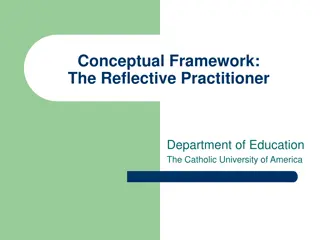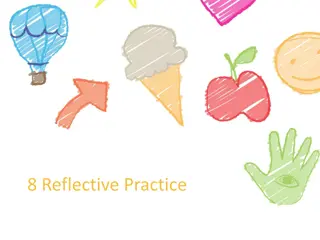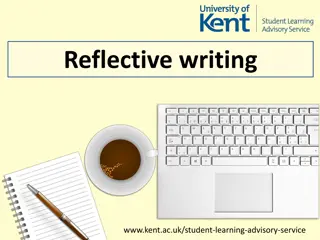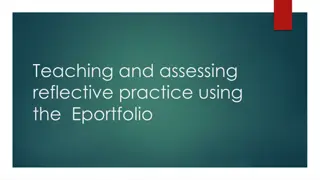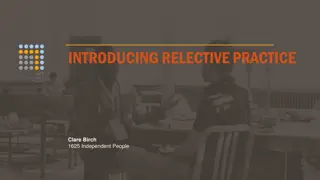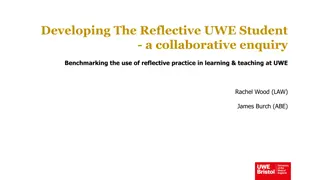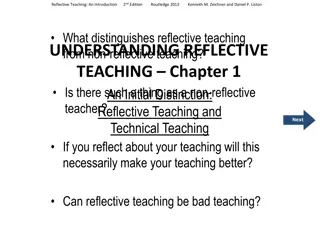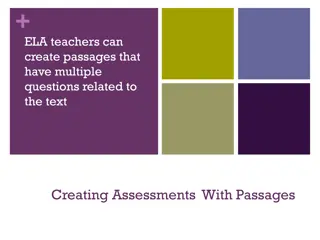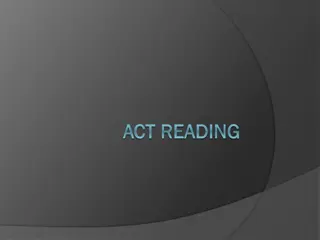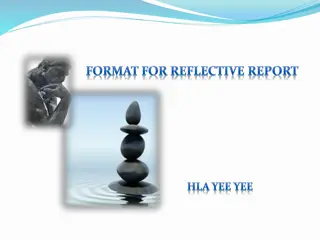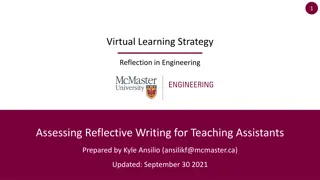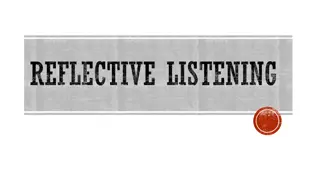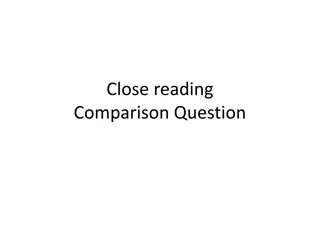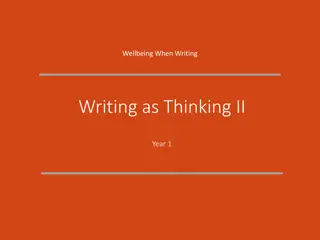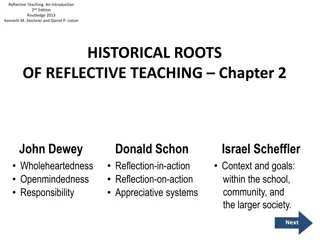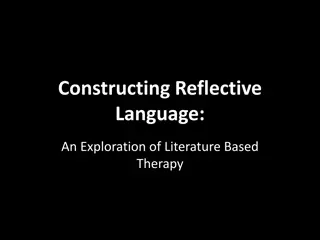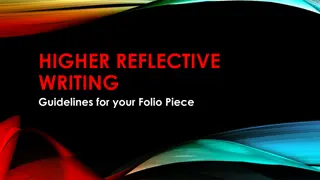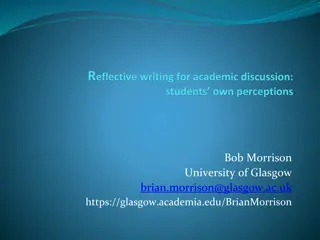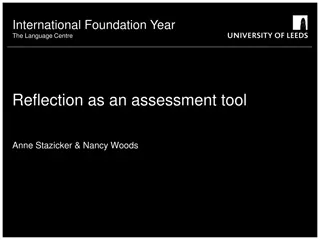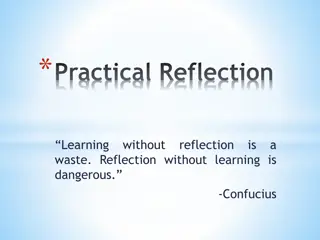Exploring Personal Reflective Writing Through Two Engaging Passages
Personal reflective writing involves exploring your reactions to events or experiences, delving into your thoughts and emotions to provide a unique perspective. This form of writing goes beyond mere storytelling and requires genuine reflection and introspection to create engaging and authentic narratives. The provided passages illustrate different encounters, highlighting the importance of introspection and personal interpretation in crafting compelling reflective pieces.
Download Presentation

Please find below an Image/Link to download the presentation.
The content on the website is provided AS IS for your information and personal use only. It may not be sold, licensed, or shared on other websites without obtaining consent from the author. Download presentation by click this link. If you encounter any issues during the download, it is possible that the publisher has removed the file from their server.
E N D
Presentation Transcript
PERSONAL WRITING S2 ENGLISH
LEARNING INTENTIONS To improve my ability to reflect thoughtfully. To begin planning out my own piece of Personal Writing.
WHAT IS PERSONAL REFLECTIVE WRITING? Personal reflective writing means writing about your reaction to something that has happened to you. It is usually about one single idea or experience and will always include reflection about what has happened and your feelings about it (or your feelings at different stages).
WHAT IS PERSONAL REFLECTIVE WRITING? It is a tough thing to do - to look back on something that happened not that long ago and think about how you feel now. It s your thoughts and feelings about the experience that will make your writing original and fresh.
WHAT IS PERSONAL REFLECTIVE WRITING? One common mistake common mistake with this type of writing is making it too narrative i.e. too much story-telling and not enough reflection or reaction. You must show through your writing that you have thought about thought about your experiences and have learned learned from them in some way.
WHAT IS PERSONAL REFLECTIVE WRITING? This reflection reflection is what makes the writing interesting otherwise your essay will just be another account of someone going on holiday or entering a football competition.
PASSAGE 1 I woke up in hospital with my leg all in plaster. It was really sore and it was itchy too. My mum and dad had to come and get me. I had to go back to school the next week which wasn t much fun.
PASSAGE 2 I slowly opened my eyes as if from a deep sleep. I yawned and stretched, expecting to see the familiar pink curtains draping my bedroom window. Instead, my gaze rested on a clinical blue fabric pulled round the trolley I was lying on. Was I still dreaming? Could I really be in hospital? Then it all started coming back to me bit by bit the kerb, the parked car, the crash! What a shock to see my leg all covered in plaster! It was really sore but I tried desperately not to cry. I didn t want the nurses to think I was a baby. When I think back it was the itching that really got me not the pain. I was so glad to see my mum and dad when they came to fetch me. I couldn t hold back my tears any longer; my mum looked so worried when she saw me. It was difficult going back to school with everyone staring at me. At first I felt so awkward, like a stranger lost in a big city, but gradually I got used to it and people grew used to the sight of me hobbling around the corridors
PAIRED TASK 1. Which of these two passages is better? 2. Why do you think this? 3. In Passage 2, where do we see the writer reflecting on their experiences? 4. Write down the words and phrases which show this reflection.
WHEN WE WRITE OUR PERSONAL ESSAYS WE NEED TO Use descriptive language (talk about what we see, Use descriptive language (talk about what we see, hear, smell, touch and taste) hear, smell, touch and taste) Use imagery to help paint a picture in our reader s Use imagery to help paint a picture in our reader s mind (metaphors, similes, personification) mind (metaphors, similes, personification) Discuss our thoughts and feelings in detail Discuss our thoughts and feelings in detail Show our personality in our writing Show our personality in our writing Reflect on our experiences Reflect on our experiences
A GOOD START Getting your essay off to a strong start is vital. The beginning of an essay is important because it sets the tone and hooks the reader in. We are now going to look at the opening of a piece of non-fiction work and discuss it.
An experience I will always remember is when me, my mum, my dad and my little brother all went on holiday to Mallorca. I had never been so excited in my life. When we got to the airport I was really excited. I had never been on a plane before and couldn t wait to take off. We had to wait for ages in the departure lounge and it was really boring. Finally they announced our flight and we all got on the plane. I was really excited but I was also nervous as I had never flown before and didn t know what to expect.
A GOOD START A common mistake common mistake when writing a personal piece is to start with a narrative introduction, as we have seen. So, how can you make your essay stand out and make your reader want to keep reading to find out what happens next? There are several techniques you could consider, such as opening with a flashback flashback, a question but most importantly you must focus on capturing the attention attention of your reader. question, or dialogue capturing the dialogue,
A few months ago after my twenty-first birthday, a stranger called to give me the news. Dreams from My Father , Barack Obama Dreams from My Father , Barack Obama
As the corpse went past the flies left the restaurant table in a cloud and rushed after it, but they came back a few minutes later. Marrakech , George Orwell Marrakech , George Orwell
My sharpest memory is of a single instant surrounded by dark. The Liars Club , Mary Karr The Liars Club , Mary Karr
People ask, How did you get in there? What they really want to know is if they are likely to end up in there as well. Girl, Interrupted , Susanna Girl, Interrupted , Susanna Kaysen Kaysen
Ever since childhood, when I lived within earshot of the Boston and Maine, I have seldom heard a train go by and not wished I was on it. The Great Railway Bazaar , Paul Theroux The Great Railway Bazaar , Paul Theroux
INDIVIDUAL TASK Write your own version of the first opening paragraph we looked at, using a more engaging method to open the essay.
An experience I will always remember is when me, my mum, my dad and my little brother all went on holiday to Mallorca. I had never been so excited in my life. When we got to the airport I was really excited. I had never been on a plane before and couldn t wait to take off. We had to wait for ages in the departure lounge and it was really boring. Finally they announced our flight and we all got on the plane. I was really excited but I was also nervous as I had never flown before and didn t know what to expect.
VOCABULARY AND WORD CHOICE To make your writing more appealing it is important to use a varied vocabulary varied vocabulary to help express yourself. Choose words which carry as much meaning as possible. For example, instead of using smile , you could use smirk . What is the difference between these words in terms of what they suggest suggest?
VOCABULARY AND WORD CHOICE What does the word denotation denotation mean? What does the word connotation connotation mean?
VOCABULARY AND WORD CHOICE Write down the denotation and connotation of the following words: Emaciated Thrifty Sunshine Lazy
VOCABULARY AND WORD CHOICE Vocabulary Grid Vocabulary Grid Take a few minutes to chat with your partner about the vocabulary grid in front of you. Try to add as many words as you can think of into each section of the grid. Keep the grid in your English folder and each time you hear Keep the grid in your English folder and each time you hear or see a good descriptive word you should add it to your or see a good descriptive word you should add it to your grid. grid.
FIGURATIVE LANGUAGE A good piece of personal writing should include a range of figurative language as metaphors, similes or personification. Figurative language will help your reader imagine the scene you are trying to create in much greater detail. The following tasks should help refresh your memory. figurative language, such
SIMILE 1.What is a simile? Write down the definition. 2.Write down an example which will help you remember. 3.Describe the images revealed in the following similes: 1.The room was as cold as ice. 2.Her eyes were like sapphires. 3.His grip on the bat was like a vice.
METAPHOR 1. What is a metaphor? Write down the definition. 2. Write down an example which will help you remember. 3. Make up metaphors to help describe these characters: 1. An old person 2. Somebody who moves slowly 3. Somebody who moves very quickly
PERSONIFICATION 1. What is personification? Write down a definition. 2. What atmosphere do these examples create: 1. The river murmured softly. 2. The walls listened intently. 3. The trees sighed gently. 3. Write down an example which will help you remember the definition of personification.
ALLITERATION 1. Write down a definition of alliteration. 2. Write down an example of alliteration. 3. Why might you include alliteration in your writing? 4. Try to create alliterative descriptions for the following: 1. Grass 2. Sand 3. The sky
ONOMATOPOEIA 1. Write down a definition of onomatopoeia. 2. What does onomatopoeia help add to a piece of writing? 3. Add as many words as you can to the following examples of onomatopoeia: scrape, crunch, bang, crash, crack 4. Create a descriptive sentence including at least two examples of onomatopoeia.
PAIRED TASK Read through the paragraphs on the sheet in front of you. Underline any examples of figurative language language being used that you see and label label what they are. figurative
THE SENSES What are the five senses? Sight Sound Smell Taste Touch
THE FIVE SENSES - TASK I tumbled towards the floor, crashing down on my ankle. I heard a terrible snap and felt a shocking pain seizing my leg. I had that terrible sensation of tasting my own blood in my mouth I must have bitten my tongue as I collapsed. I glanced at my broken joint and was overcome with a wave of nausea as I realised my once straight and slender ankle was bent like a boomerang.
USING THE FIVE SENSES - INDIVIDUAL TASK Using the five senses, develop the following sentences below into a short descriptive paragraph. For example, the paragraph on the previous page was developed from I hurt my ankle. 1. I won a competition 2. I could not fall asleep 3. I was almost hit by a car
HOW TO WRITE A STRONG ENDING - Look back and sum up your experience and the impact it has had on you. - Have your opinions or views changed with the passage of time? - What have you learned from your experiences? Give a detailed reflection in your final paragraph.
PERSONAL ESSAY SUCCESS CRITERIA What do we need to do in order to write a successful personal essay? 1. Write an engaging opening paragraph engaging opening paragraph which hooks our readers in 2. Use figurative language figurative language and sensory description throughout to make our writing interesting and detailed 3. Discuss our thoughts and feelings thoughts and feelings throughout our essay 4. 4. Reflect on our experiences Reflect on our experiences in our conclusion sensory description
Question: Question: You are going to write about a time when you felt a strong emotion in your life (e.g. love, hate, anger, sadness).
WRITING YOUR PERSONAL ESSAY Planning Planning Use a mind map or plotline to plan out what your essay is going to be about. Think about where you will add descriptions, figurative language, and reflection. Writing Writing Once you have completed your plan, you can begin writing. You can listen to music You can listen to music through headphones while through headphones while you work if you wish! you work if you wish!

 undefined
undefined


